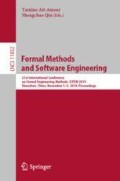Abstract
As a quantum counterpart of labeled transition system (LTS), quantum labeled transition system (QLTS) is a powerful formalism for modeling quantum programs or protocols, and gives a categorical understanding for quantum computation. With the help of quantum branching monad, QLTS provides a framework extending some ideas in non-deterministic or probabilistic systems to quantum systems. In this paper, we propose the notion of reactive quantum system (RQS), a variant of QLTS, and develop a coalgebraic semantics for both QLTS and RQS by an endofunctor on the category of convex sets, which has a final coalgebra. Such a coalgebraic semantics provides a unifying abstract interpretation for both QLTS and RQS. The notions of bisimulation and simulation can be employed to compare the behavior of different types of quantum systems and judge whether a coalgebra can be behaviorally simulated by another.
Access this chapter
Tax calculation will be finalised at checkout
Purchases are for personal use only
References
Ardeshir-Larijani, E., Gay, S.J., Nagarajan, R.: Equivalence checking of quantum protocols. In: Piterman, N., Smolka, S.A. (eds.) TACAS 2013. LNCS, vol. 7795, pp. 478–492. Springer, Heidelberg (2013). https://doi.org/10.1007/978-3-642-36742-7_33
Coecke, B., Kissinger, A.: Picturing Quantum Processes. Cambridge University Press, Cambridge (2017)
Davidson, T.A.S.: Formal verification techniques using quantum process calculus. PhD thesis, University of Warwick, Coventry, UK (2012)
Deng, Y., Feng, Y.: Open bisimulation for quantum processes. In: Baeten, J.C.M., Ball, T., de Boer, F.S. (eds.) TCS 2012. LNCS, vol. 7604, pp. 119–133. Springer, Heidelberg (2012). https://doi.org/10.1007/978-3-642-33475-7_9
Feng, Y., Deng, Y., Ying, M.: Symbolic bisimulation for quantum processes. ACM Trans. Comput. Logic 15(2), 14:1–14:32 (2014)
Feng, Y., Duan, R., Ying, M.: Bisimulation for quantum processes. ACM Trans. Program. Lang. Syst. 34(4), 17:1–17:43 (2012)
Feng, Y., Nengkun, Y., Ying, M.: Model checking quantum markov chains. J. Comput. Syst. Sci. 79(7), 1181–1198 (2013)
Gay, S.J., Nagarajan, R.: Communicating quantum processes. In: Proceedings of POPL 2005, pp. 145–157. ACM (2005)
Hasuo, I., Hoshino, N.: Semantics of higher-order quantum computation via geometry of interaction. Ann. Pure Appl. Logic 168(2), 404–469 (2017)
Hirvensalo, M.: Quantum automata theory – a review. In: Kuich, W., Rahonis, G. (eds.) Algebraic Foundations in Computer Science. LNCS, vol. 7020, pp. 146–167. Springer, Heidelberg (2011). https://doi.org/10.1007/978-3-642-24897-9_7
Jacobs, B.: Cambridge tracts in theoretical computer science. Introduction to Coalgebra: Towards Mathematics of States and Observation, vol. 59. Cambridge University Press, Cambridge (2016)
Kondacs, A., Watrous, J.: On the power of quantum finite state automata. In: Proceedings of FOCS 1997, pp. 66–75. IEEE Computer Society (1997)
Kubota, T., Kakutani, Y., Kato, G., Kawano, Y., Sakurada, H.: Application of a process calculus to security proofs of quantum protocols. In: Proceedings of the International Conference on Foundations of Computer Science (FCS), p. 1. The Steering Committee of The World Congress in Computer Science, Computer (2012)
Dal Lago, U., Rioli, A.: Applicative Bisimulation and Quantum \(\lambda \)-Calculi. In: Dastani, M., Sirjani, M. (eds.) FSEN 2015. LNCS, vol. 9392, pp. 54–68. Springer, Cham (2015). https://doi.org/10.1007/978-3-319-24644-4_4
Li, L., Feng, Y.: Quantum Markov chains: description of hybrid systems, decidability of equivalence, and model checking linear-time properties. Inf. Comput. 244, 229–244 (2015)
Molina, A., Watrous, J.: Revisiting the simulation of quantum turing machines by quantum circuits. CoRR, abs/1808.01701 (2018)
Moore, C., Crutchfield, J.P.: Quantum automata and quantum grammars. Theor. Comput. Sci. 237(1–2), 275–306 (2000)
Nielsen, M.A., Chuang, I.: Quantum Computation and Quantum Information. Cambridge University Press, Cambridge (2002)
Nishimura, H., Ozawa, M.: Perfect computational equivalence between quantum turing machines and finitely generated uniform quantum circuit families. Quant. Inf. Process. 8(1), 13–24 (2009)
Ogawa, H.: Coalgebraic approach to equivalences of quantum systems. Master’s thesis, University of Tokyo (2014)
Roumen, F.: Coalgebraic quantum computation. In: Proceedings of QPL 2012, vol. 158, EPTCS, pp. 29–38 (2014)
Selinger, P.: Towards a quantum programming language. Math. Struct. Comput. Sci. 14(4), 527–586 (2004)
Sokolova, A.: Coalgebraic analysis of probabilistic systems. PhD thesis, Technische Universiteit Eindhoven (2005)
Urabe, N., Hasuo, I.: Generic forward and backward simulations III: quantitative simulations by matrices. In: Baldan, P., Gorla, D. (eds.) CONCUR 2014. LNCS, vol. 8704, pp. 451–466. Springer, Heidelberg (2014). https://doi.org/10.1007/978-3-662-44584-6_31
Yanofsky, N.S., Mannucci, M.: Quantum Computing for Computer Scientists. Cambridge University Press, Cambridge (2008)
Ying, M.: Foundations of Quantum Programming. Morgan Kaufmann, Burlington (2016)
Ying, M., Feng, Y.: Quantum loop programs. Acta Informatica 47(4), 221–250 (2010)
Ying, M., Feng, Y., Duan, R., Ji, Z.-R.: An algebra of quantum processes. ACM Trans. Comput. Logic 10(3), 191–1936 (2009)
Ying, S., Ying, M.: Reachability analysis of quantum Markov decision processes. Inf. Comput. 263, 31–51 (2018)
Acknowledgement
We are indebted to Luis S. Barbosa and Renato Neves for helpful discussions regarding the coalgebraic framework. This work has been supported by the National Natural Science Foundation of China under grant no. 61772038, 61532019 and 61272160, and the Guangdong Science and Technology Department (Grant no.2018B010107004).
Author information
Authors and Affiliations
Corresponding author
Editor information
Editors and Affiliations
Rights and permissions
Copyright information
© 2019 Springer Nature Switzerland AG
About this paper
Cite this paper
Liu, A., Sun, M. (2019). A Coalgebraic Semantics Framework for Quantum Systems. In: Ait-Ameur, Y., Qin, S. (eds) Formal Methods and Software Engineering. ICFEM 2019. Lecture Notes in Computer Science(), vol 11852. Springer, Cham. https://doi.org/10.1007/978-3-030-32409-4_24
Download citation
DOI: https://doi.org/10.1007/978-3-030-32409-4_24
Published:
Publisher Name: Springer, Cham
Print ISBN: 978-3-030-32408-7
Online ISBN: 978-3-030-32409-4
eBook Packages: Computer ScienceComputer Science (R0)

